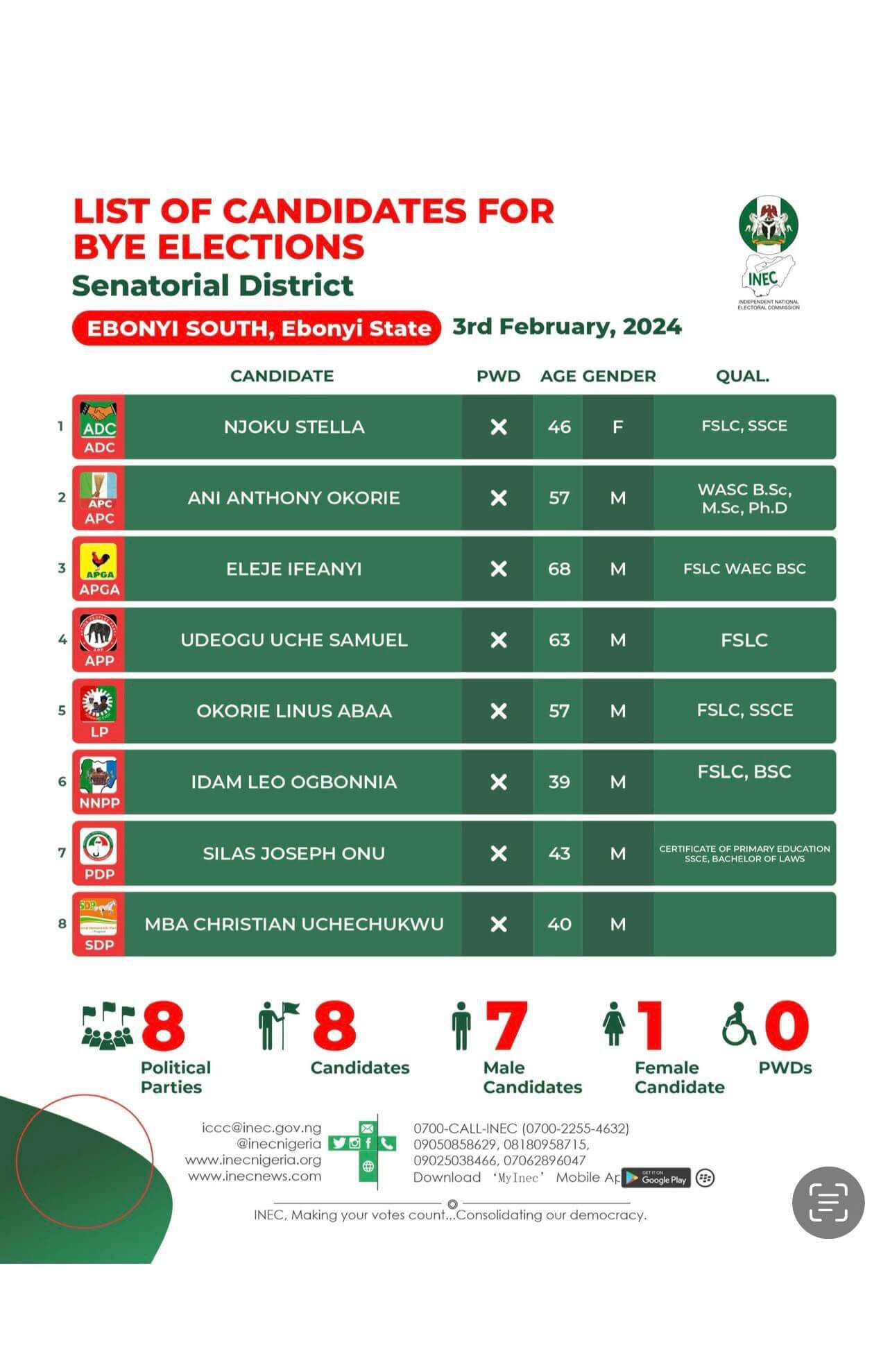
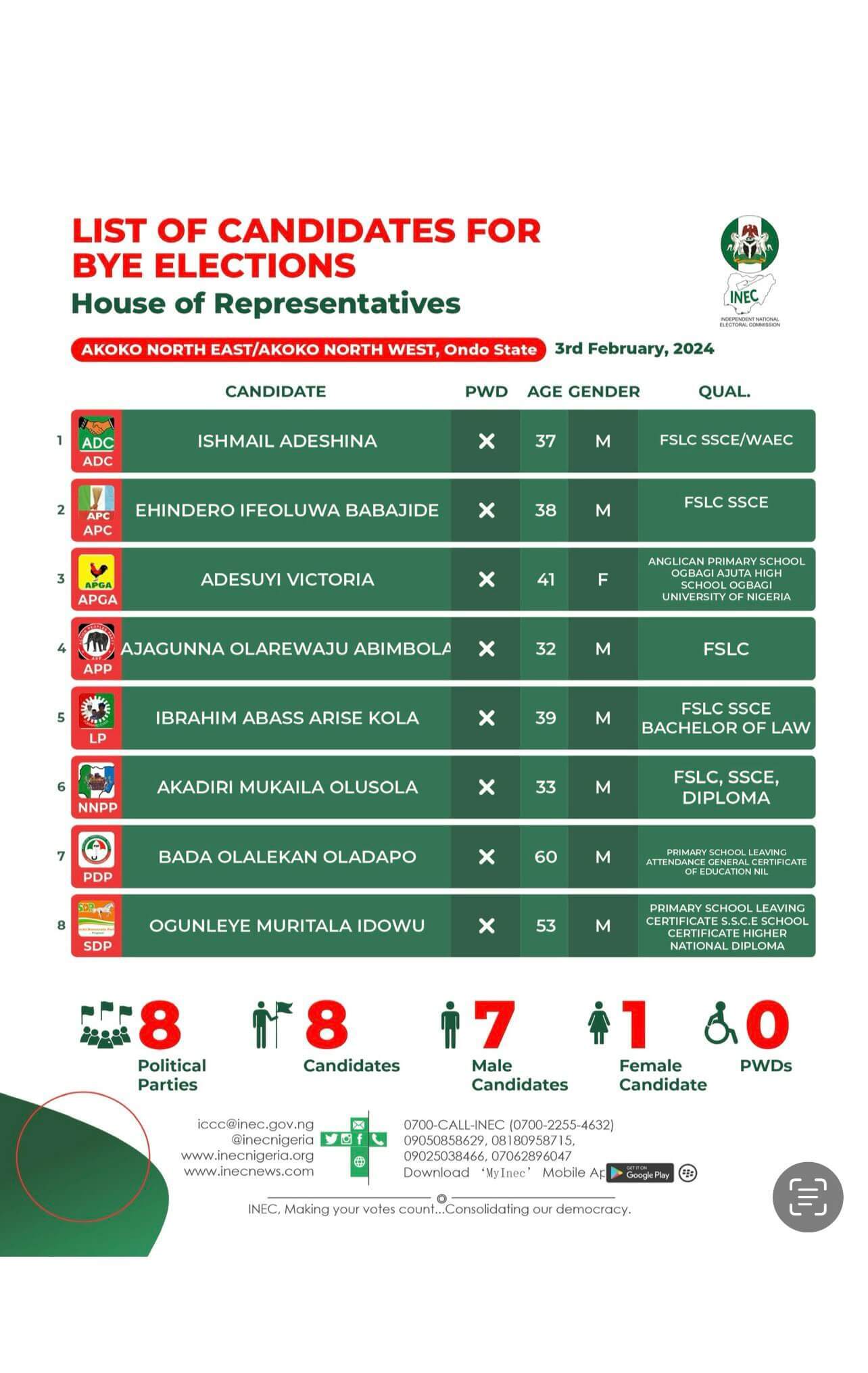
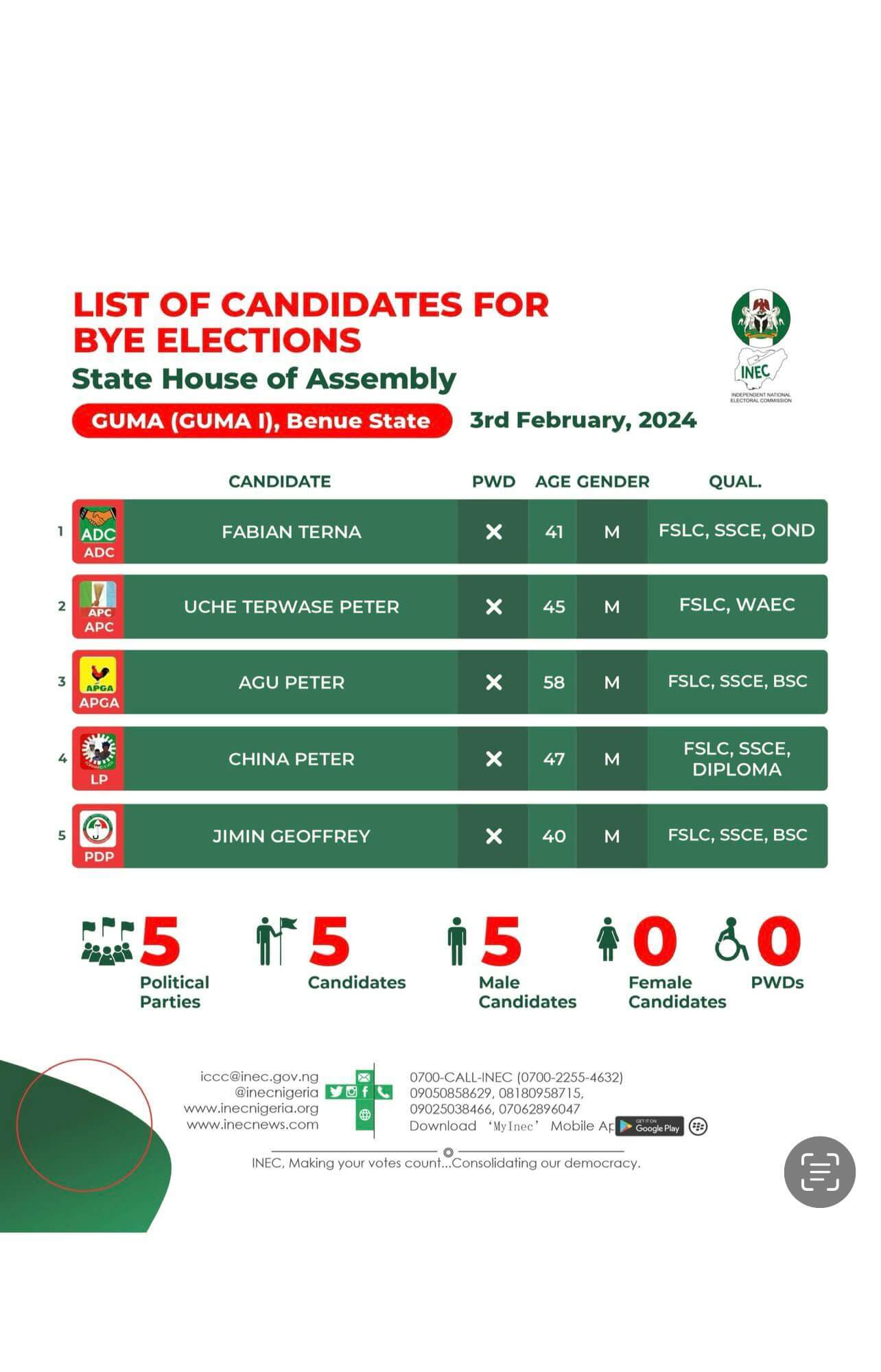
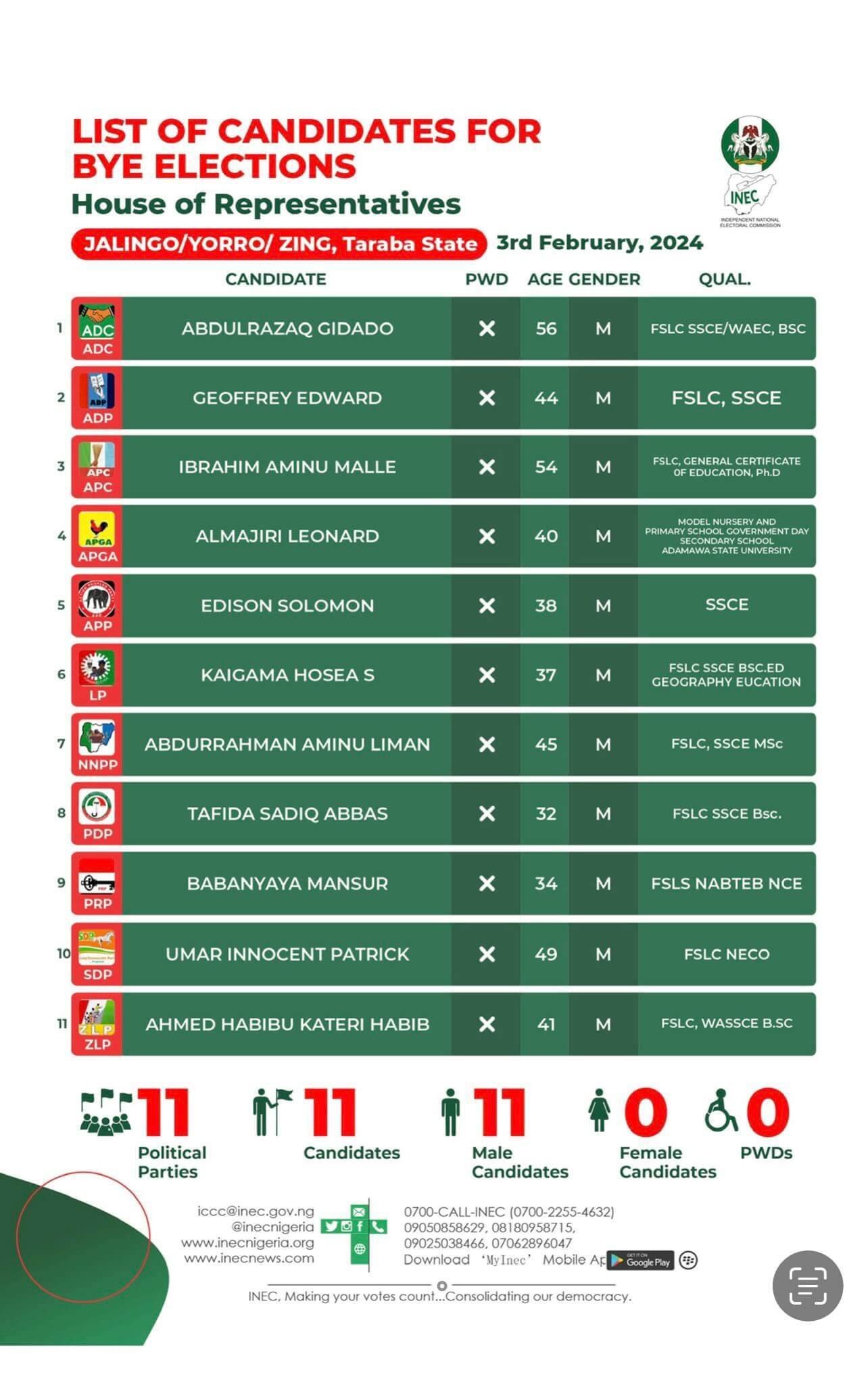
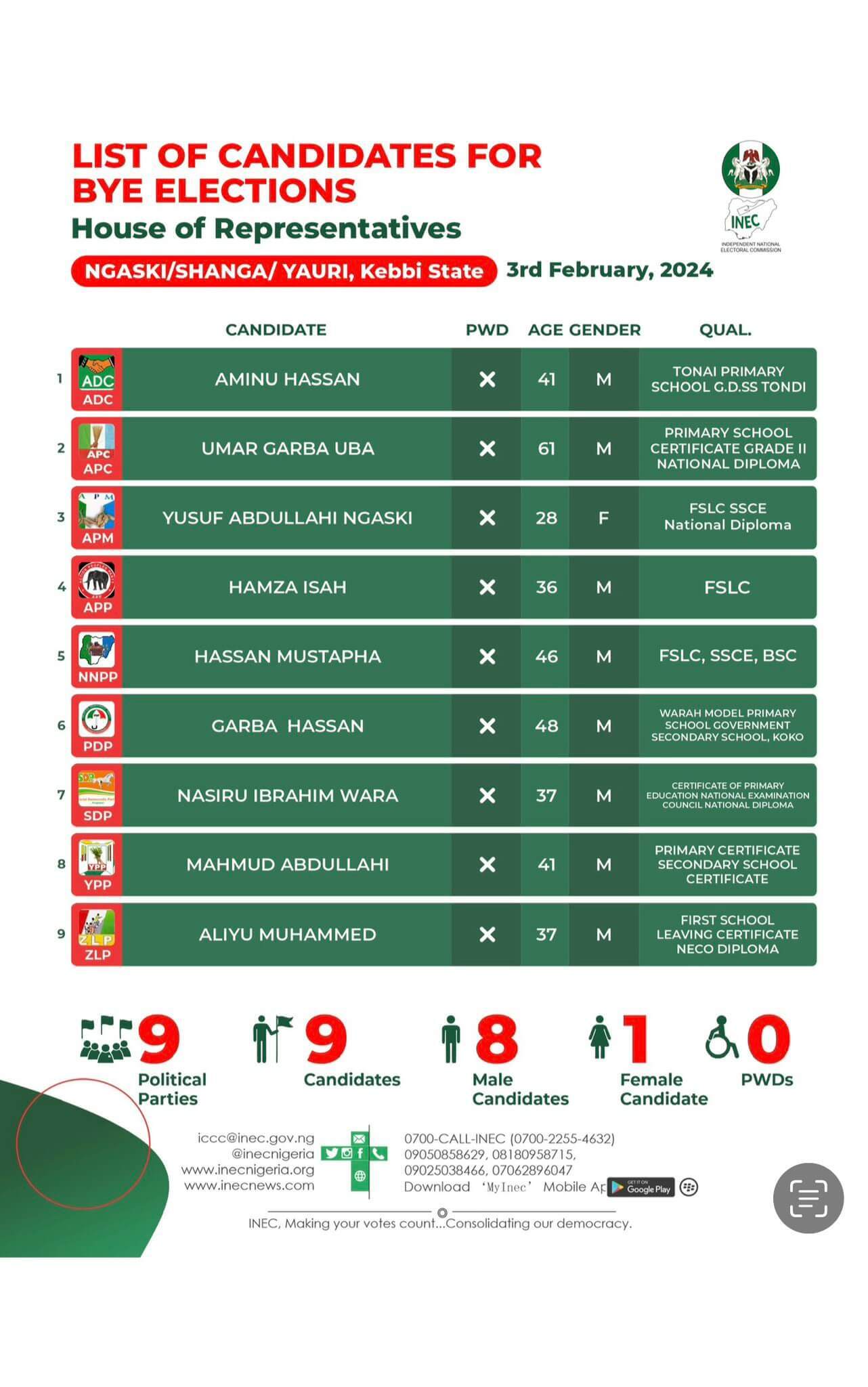
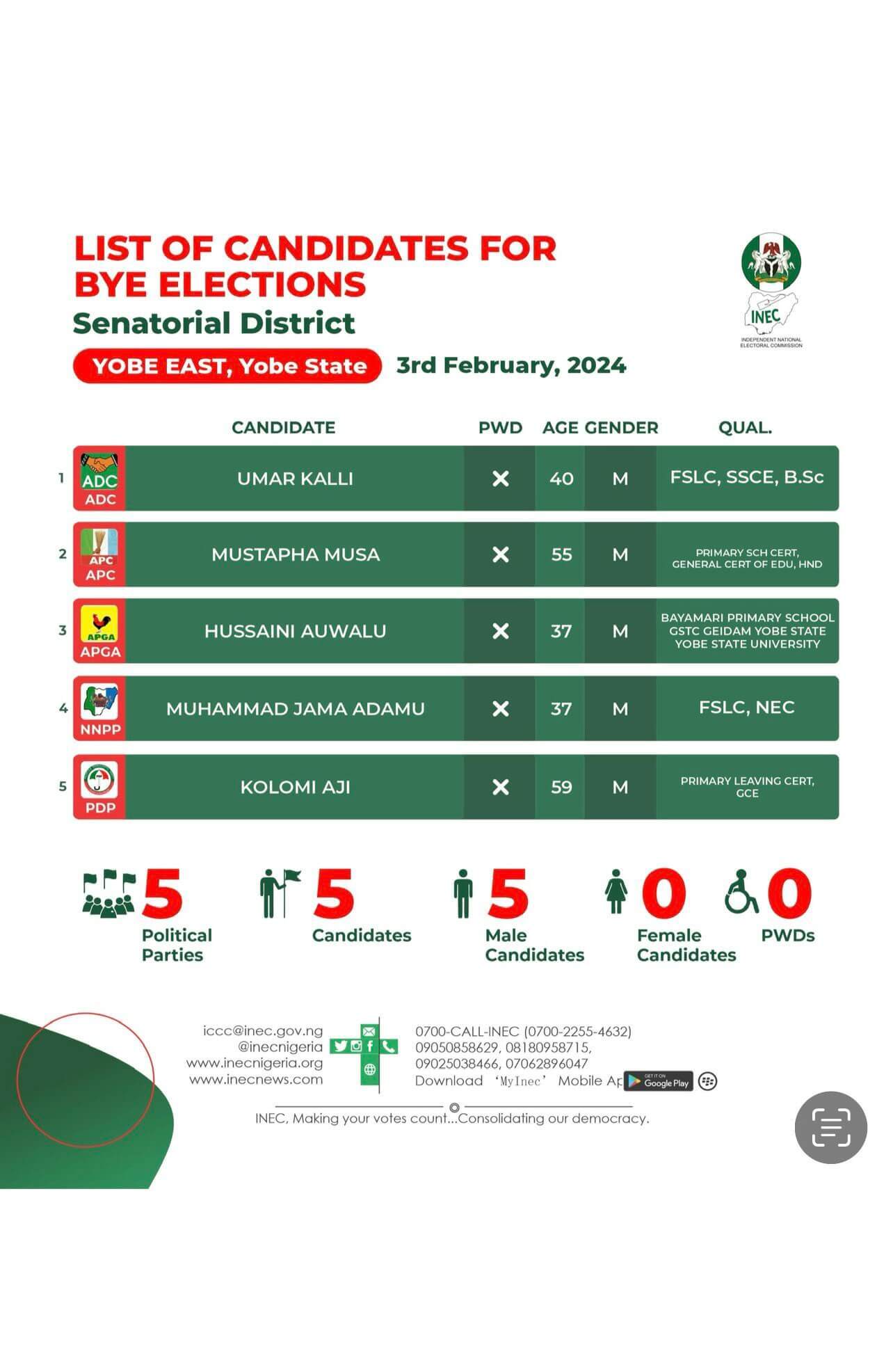
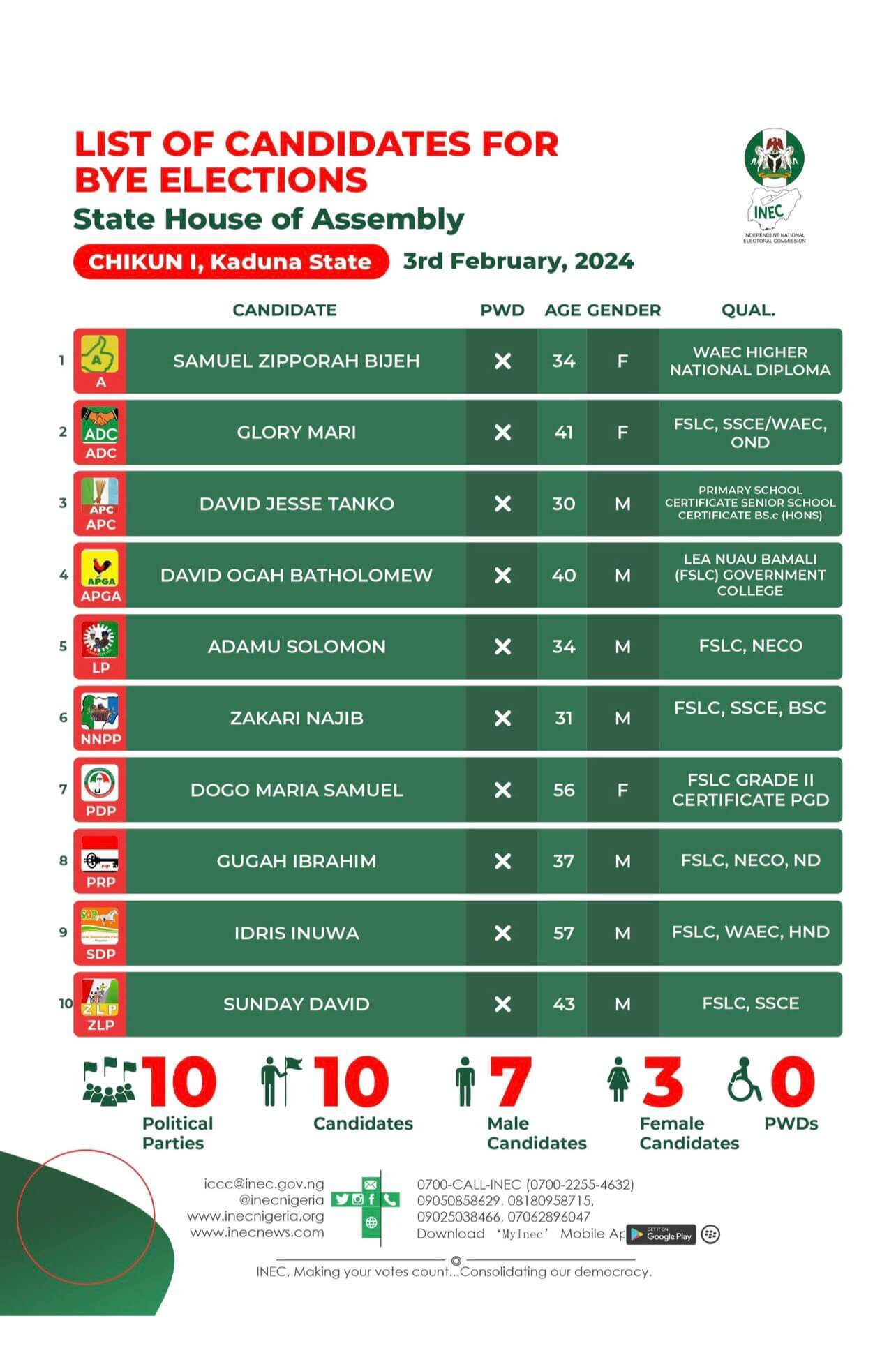
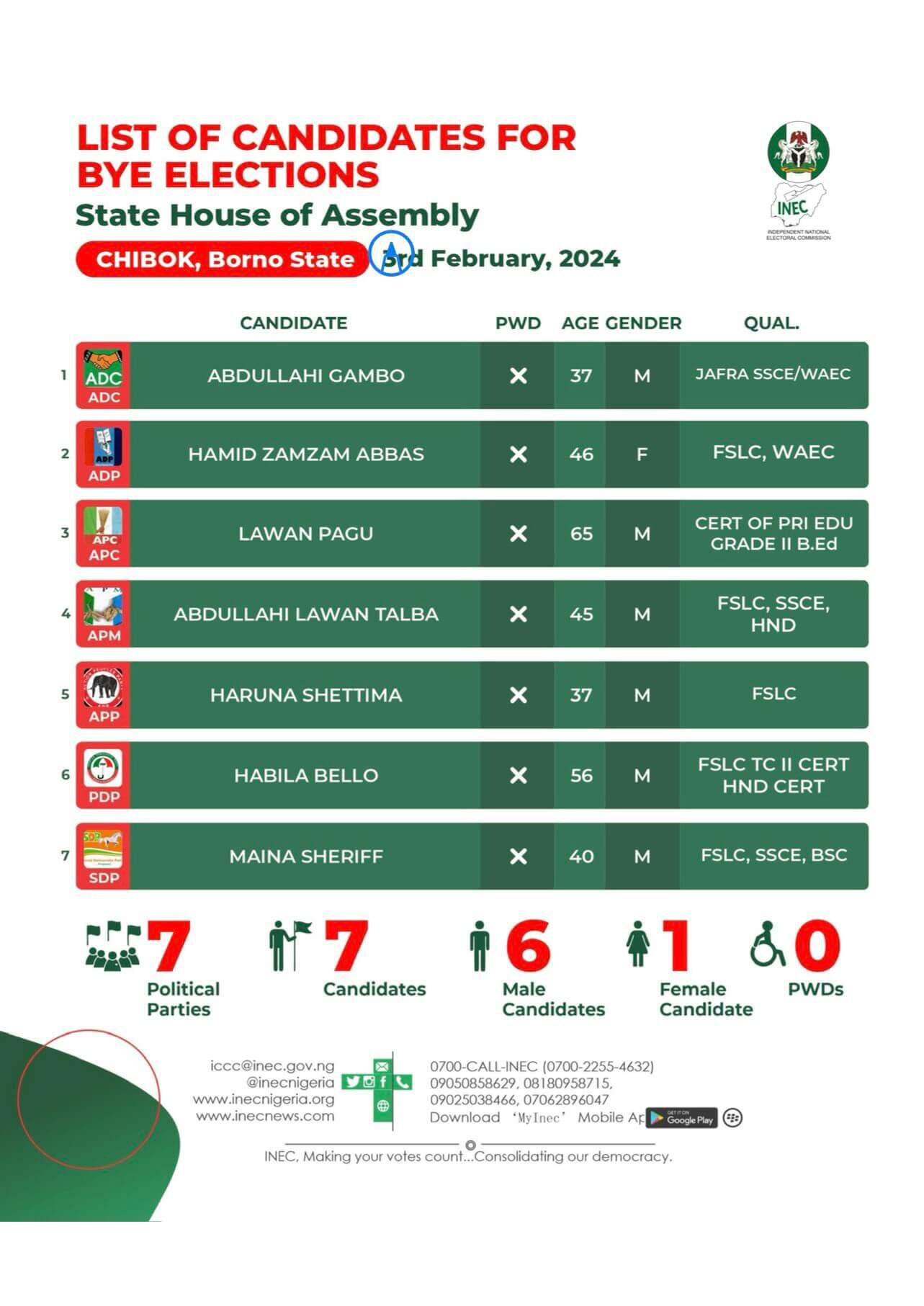
The Independent National Electoral Commission (INEC) has published the final list of candidates for the February 3, 2024 by-election in Nigeria.
In a statement on Wednesday, INEC National Commissioner, Sam Olumekun, said the by-elections become necessary because of death or resignation of members of the National and State Houses of Assembly.
“These elections will be held on Saturday 3rd February 2024 across nine States of the Federation covering two Senatorial Districts (Ebonyi South and Yobe East); four Federal Constituencies (Shanga/Ngaski/Yauri Federal Constituency of Kebbi State, Surulere I Federal Constituency of Lagos State, Akoko North East/Akoko North West Federal Constituency of Ondo State and Jalingo/Yorro/Zing Federal Constituency of Taraba State); and three State Constituencies (Guma I State Constituency of Benue State, Chibok State Constituency of Borno State and Chikun State Constituency of Kaduna State),” the statement partly read.
The commissioner said the timetable and schedule of activities, the personal particulars and final list of candidates have been published in INEC state offices and the affected constituencies pursuant to the provision of Section 29(3) of the Electoral Act, 2022.
“The list of candidates is also published on our website and social media platforms.
“We appeal to Nigerians to scrutinize the personal particulars (Form EC9 and academic credentials) of the candidates. Any aspirant who participated in his/her party primaries with reasonable grounds to believe that the information provided by the candidate is false can challenge the nomination in a Federal high Court as provided in Section 29(5) of the Electoral Act 2022.
“For clarity, this publication only applies to the forthcoming bye-elections as they are fresh elections for which political parties conducted primaries and nominated their candidates.
“For the re-run elections to be held on the same day, the list and personal particulars of candidates have been published before the 2023 General Election. The re-run elections are conducted pursuant to the orders of the Election Petition Appeal Tribunals. They are not fresh elections open to new/disqualified candidates which obviates the need to publish their personal particulars again.”
See the full list:
Governor Seyi Makinde of Oyo State has verified that the mining company implicated in the storage of explosive devices, leading to the Ibadan explosion, lists foreign names on its Corporate Affairs Commission (CAC) document.
Makinde made this statement while appearing on Channel TV on Wednesday.
The governor also mentioned that the tragic blast’s death toll has climbed to three, with another victim who died in a hospital today.
Recall that on Tuesday, January 16, 2024, an explosion occurred at Dejo Oyelese Street, Bodija area of Ibadan, resulting in now three deaths and numerous injuries.
- “The truth is that we have identified the company involved with the storage of explosive devices in that particular building.
- “We are trying to uncover the identities of the people. We’ve done a few fact-finding on the company involved, and yes, there are indeed some foreign names on the CAC documents of the company involved, but these are still early days.”
Reacting to the question of whether the blast was caused by a terrorist group or banditry, Makinde said that the blast was not caused by any terrorist group or bandits.
- “We have an individual of interest who the security agencies should be inviting for questioning.
- “I repeat my position that anyone who has contributed to putting this tragedy upon us, we will bring them to book.
- “It is not anything that has to do with banditry or insurgency. It is simply illegal miners who decided to store explosives in residential areas,” he added.
What you should know
Earlier on Tuesday, an area in Ibadan, Oyo state, experienced an explosion, leading to fears of a significant number of casualties.
The blast occurred on Tuesday, January 16, at about 7:30 pm and has damaged properties.
Subsequently, Governor Seyi Makinde later confirmed the loss of three lives and reported 77 individuals currently receiving treatment in both public and private hospitals.
In addition, the governor said the investigation revealed that the blast was caused by the activities of illegal miners in the city of Ibadan, although he did not name any culprit involved in the activity.
Meanwhile, President Bola Tinubu has ordered that a thorough investigation should be carried out to uncover the real reason behind the blast.
[Nairametrics]
Governor Caleb Mutfwang of Plateau State has raised an alarm that the security agencies in the country have been infiltrated by fifth columnists, including people who are agents of criminals unleashing mayhem on Plateau and other parts of the country.
The governor made this claim Wednesday on Trust TV’s Daybreak Show while responding to questions on the response of security agencies after violent attacks in the state and other parts of the country.
Plateau State recently suffered coordinated attacks on 23 villages in Bokkos and Barkin Ladi local government areas, which left over 150 dead and many others injured.
After the attacks, there had been outrage across the country on how such coordinated attacks could have taken place despite the presence of the military’s Operation Safe Haven in the state, in addition to other security agencies.
There was also the revelation that despite several distress calls by the communities, the assailants carried out the attacks for hours and left before the security agencies arrived.
Recall that shortly after the sporadic attacks on Plateau villages between December 23 and 24, 2023, Governor Mutfwang said the military received 36 distress calls.
“I was made to understand by the GOC that on Saturday (the eve of the attacks) alone, they had distress calls from 36 points almost simultaneously.
“That will tell you that that is a logistic issue right there…,” the governor stated.
‘Many loopholes in security architecture’
Responding to a question during his interview with Trust TV on where the problem lies, the governor said the work of these fifth columnists within the security agencies makes it difficult for prompt response by the security agencies.
He said, in many instances, several lives of security personnel have been lost after being ambushed due to information leaked by the fifth columnists.
He said, “…Let me also say this; fifth columnists have infiltrated the security agencies. This is a fact we must confront as a nation.
There are many people who should not be there; they are agents of these criminals, and sometimes they even compromise their colleagues. And that is why you have a lot of ambushes sometimes when these security agencies are going on operations.”
The governor added that President Bola Tinubu must give a very firm directive to the security agencies that in the ongoing recruitment processes, diligence must be taken.
“Diligence must be observed to ensure that wrong elements are not recruited into the armed forces and the security agencies. But there must also be a mechanism to be able to fish out these bad eggs within the security services.
“It is only when we do that, that there will be professionalism and discipline, and also some bit of empathy to the victims of these attacks,” he said. He said while the government continues to conscientise and mobilise the communities to be able to defend themselves, the overzealousness of some security officers on the ground makes the process difficult and renders the government’s efforts to be counter-productive.
Self-defence is necessary
Governor Mutfwang said communities in Plateau were being advised to be vigilant.
“I will continue to ensure that the communities are sufficiently conscientious to look out for one another. And so, that also gives the security agencies the opportunity to come in as their response time will be greatly reduced.
“There are areas where we can improve, certainly, but beyond that, we are also trying to ensure that the communities themselves are sufficiently conscientised and mobilised to be able to defend themselves, because the security forces can only come in and go, the people still remain in their localities, and they form borders at the last line of defence.
“We must be able to balance. We cannot just leave people to possess guns without control and accountability. And so, my own is that even if we are armed in communities, there must be a registration process.
“You should be able to boost the morale of those who stand up to defend their communities and not arrest them. We have had a few excesses, which we have reported to the authorities.
“We have witnessed a lot of overzealousness by some of the security agencies’ operatives on the ground, who instead of cooperating with locals, when they find them sometimes with ordinary machetes, they confiscate them and we have engaged their commanders to say no, this is not right,” he said.
The governor also said he is an advocate of state police and balanced gun control.
“I am a firm believer in state police. Sincerely, I have heard so many arguments about it: the tendency of governors to misuse their powers, and so on and so forth.
We cannot continue to live in fear and refuse to face realities. Globally, security is a local issue. And unless we can bring it down to the level of the communities, we may not achieve much success,” he said.
We’ve our shortcomings
Governor Caleb also admitted that since governors are human beings, the tendency to misuse or abuse of power cannot be ruled out.
He said examples of countries like the United States of America can be used to counter this fear, arguing that where there is noticeable evidence of abuse of state police by any governor, the federal police, as is the case in the USA, can be called in to restore order.
“So, I think for effectiveness, we cannot run away from the issue of state police. We must look at it critically; all the talks about community policing by the Nigeria Police Force. I do not think it is effective, because the time span for dissemination of information and decision making is very critical. When you have a situation where there is an attack in the community and the police will (only) be able to mobilise to counter it at three, four hours away.
“It doesn’t make sense. So, we must be able to bring them closer to the theatre of conflict,” he said.
While debunking the reports that the Plateau State government was operating a militia in the form of Operation Rambo, the governor said his take on community defending themselves informed the government’s effort to conscientise and mobilise the communities to be able to stand up against attackers in their own controlled way before the security agencies are able to mobilise to the areas.
We’ll study the allegations
When contacted yesterday, the spokesman for the Nigerian Army, Onyema Nwachukwu explained that he would not be able to respond accordingly until the statements made by the governor were properly studied.
Nwachukwu, a Major-General, added that the army, and of course the entire military are professional and regimented organisations that cannot hurriedly respond to issues.
He said the comments needed to be examined after which he would get in touch with appropriate authorities before responding accordingly, if there is a need to do so.
“Let me first see the statement. The army is a professional organisation. I’m not speaking for myself but for the army. I will have to first study the governor’s comment after which we will respond accordingly, if there is a need for it,” he said.
In the same vein, the Director, Defence Information, Tukur Gusau, a Brigadier-General, also said he would like to see the clip or the statement before giving any response.
“I’m just hearing this from you. I will like to see the video clip or the statement, so that I will know how to reply,” the senior military officer told one of our correspondents in a telephone interview.
Daily Trust recalled that a few days after the incidents on the Plateau, some locals protested and called for total withdrawal of the military from the crises-prone areas, saying they preferred to have the police and other security operatives.
But the Chief of Army Staff, Lieutenant General Taoreed Lagbaja, during a visit to the state, denied the allegation that troops of the Nigerian Army deployed to Plateau State were biased in their operations.
Lagbaja said it was incorrect to accuse the Nigerian Army personnel, who he said have been tirelessly working to restore peace in the state, of being biased in their operations, adding that the organisation is impartial in its operations.
The army chief emphasised that the Nigerian Army is composed of individuals from diverse tribes and religions. Hence, it should not be regarded as personal property that can be manipulated by any single individual.
He stated this while responding to allegations by some members of the communities regarding impartiality in army operations, during a visit to NTV, one of the affected communities in Barkin Ladi Local Government Area of the state.
[DailyTrust]
A Federal High Court in Abuja has declared as null and void the provisions of the Nigeria Broadcasting Code authorizing the National Broadcasting Commission (NBC) to impose fines on broadcast stations who allegedly breach the Code.
Rita Ofili-Ajumogobia, quashed the said code on the grounds that the NBC as an administrative and regulatory bodies could not exercise judicial powers.
She made the declaration on Wednesday while delivering judgment in the suit filed by the Media Rights Agenda (MRA) against the NBC.
The suit was sequel to the Commission’s imposition of fines of N5 million each on a television station and three pay TV platforms in 2022 for allegedly undermining Nigeria’s national security through their broadcasting of documentaries on banditry in Nigeria.
The plaintiff’s in the suit filed on their behalf by their lawyer, Uche Amulu, asked the court to hold, among others, that the NBC’s action of imposing a fine on each of the media platforms and the station for broadcasting a documentary about the state of banditry and security in Zamfara State is unlawful and unconstitutional and has a chilling effect on the freedom of media to impart information and ideas.
The plaintiff further submitted that the action of the NBC would deter the platforms and station from reporting the true state of affairs regarding the security situation in the country, and thereby violating the rights of MRA, its members, and other citizens of Nigeria to freedom of expression, particularly their rights to receive ideas and information without interference, as guaranteed by the Constitution and the African Charter on Human and People’s Rights.
Subsequently, the plaintiff urged the court to declare that the procedure adopted by the NBC in imposing the fines is a flagrant violation of the rules of natural justice and the right to fair hearing under Section 36 of the Constitution and Article 7 of the African Charter as the Commission is the drafter of the Code, which provides for the alleged offences for which the media platforms and the station were punished, and which empowers the NBC to receive complaints, investigate and adjudicate on the complaints, impose fines and collect fines.
MRA contended that the NBC, not being a court of law and not having been constituted in manner as to secure its independence and impartiality, has no power or competence to impose fines on broadcast stations as punishment or penalties for the commission of an offence as the competence to establish that an offence has been committed and to impose criminal sanctions or penalties belongs to the courts.
Besides, it claimed, the NBC, not being the Nigerian Police or a law enforcement agency, has no power to conduct a criminal investigation or an investigation that could lead to criminal charges against the affected media platforms and stations or the imposition of criminal penalties and accordingly, that the investigation purportedly conducted by the Commission, leading to the fines imposed on the media platforms and station for alleged offences under the Nigeria Broadcasting Code is ultra vires, null and void.
MRA also urged the Court to declare that the Nigeria Broadcasting Code issued by the NBC, being a subsidiary legislation that empowers it as a regulatory and administrative body to enforce the provisions of the Code, cannot confer judicial powers or jurisdiction in criminal matters on the Commission to impose criminal sanctions or penalties such as fines, particularly as the Code was made by the NBC itself.
It urged the Court to declare the fines unconstitutional, ultra vires, null and void, set them aside and issue an order of perpetual injunction restraining the NBC, its servants, agents, privies, representatives or anyone acting for or on its behalf, from further imposing any fine on any of the media platforms or station, or any other broadcast station in Nigeria for any alleged offence committed under the Nigeria Broadcasting Code.
Delivering judgment Wednesday in suit, Ofili-Ajumogobia agreed with the plaintiff that the NBC not being a court of law, acted above its powers by imposing such fines against the alleged offenders.
She subsequently made an order of perpetual injunction restraining the Commission or anyone acting on its behalf from further imposing any fine on any media platform or broadcast station in Nigeria for any alleged offence committed under the Nigeria Broadcasting Code.
The court then went ahead to set aside the fines imposed by the NBC on August 3, 2022 on Multichoice Nigeria Limited, owners of DSTV; TelCom Satellite Limited (TSTV); Trust-TV Network Limited; and NTA Startimes Limited for broadcasting a documentary about the state of banditry and security in Zamfara State, saying the regulator’s action was wrong and unjustifiable in a democratic society.
The judge however, refused to grant the plaintiff’s claim for N700,000 being costs of the suit.
Ofili-Ajumogobia in addition declined another claim for N2 million as general damages for NBC’s infringement on its rights as well as a request for N1 million as punitive damages for the Commission’s “outrageous conduct in abusing its powers and arbitrarily imposing fines on broadcasting stations.”
The Federal Government has assured workers that it will clear the arrears of the N35,000 wage award just as it also said the government had resumed the payment of the wage award.
The government also reiterated its commitment to addressing issues in the National Minimum Wage agreement reached with the Organised Labour in 2023.
The Minister of Labour and Employment, Nkeiruka Onyejeocha, disclosed the government’s commitment towards implementing agreements with trade unions during separate meetings with the leaderships of the Trade Union Congress and Congress of University Academics, on Wednesday in Abuja.
Onyejeocha underscored the significance of her interactions with key trade unions, emphasising the intention to uphold open lines of communication, strengthen labour relations to mitigate the likelihood of future strikes, and actively contribute to cultivating a harmonious and friendly work environment for all employees.
Onyejeocha stated that the government appreciated the plight of the trade unions, noting that her visit was not only to reiterate the government’s readiness for partnership but to keep the channels of communication open.
“I am here specifically to reassure you that we have not forgotten about the agreements between the government and trade unions. Thank God that you have confirmed that the federal government has started paying the N35,000 wage award and I can assure you that the payment is on course and the outstanding will be paid within a short period,” she said.
Onyejeocha said, “I know that the President is focused on making sure that the issue of a new national minimum wage is addressed. The government will ensure that the committee starts working in earnest.
“I do not want to wait for any stakeholder to start agitating, that is why I have come to remind you that I am aware of those agreements, and we are working round the clock to make sure they are fulfilled. If there is any that we cannot fulfil now, including the past ones, we will continue our engagements on them.”
She commended the leadership of TUC for having faith in the government and assured the union of the government’s continued readiness to listen to them, as well as partner with them for the greater good of the people.
Previously, it was reported by The PUNCH that Joe Ajaero, the President of the Nigeria Labour Congress, put forth a suggestion for a wage adjustment to be granted to the Federal Government as a measure to alleviate the impacts of the fuel subsidy removal.
The Labour Unions and the Federal Government under President Bola Tunubu’s led administration had agreed to the payment of an N35,000 wage award for lower cadre workers for the next six months to cushion the effect of the removal of subsidy.
Speaking, the President of Trade Union Congress, Comrade Festus Osifo, commended the government for some of the major steps taken so far, specifically for fulfilling up to 80 per cent of the agreement with the management of Road Transport Employers Association of Nigeria, and urged the government the fulfil the remaining 20 per cent of that agreement.
“We are not a union that waits for the government to fail to hold it to ransom. That is why we keep engaging,” Osifo said.
Findings have shown that about $18 billion representing 90 percent of the estimated $20 billion Nigeria’s diaspora remittances in 2023 did not end up in the country, Taiwo Oyedele, Chairman, Presidential Committee on Fiscal Policy and Tax Reforms, has said.
Recall that the World Bank had estimated that diaspora remittances to Nigeria in 2023 was $20 billion.
However, speaking in a panel discussion at the 2024 Economic Outlook and Budget Analysis organised by the Lagos Chamber of Commerce and Industry (LCCI), Oyedele estimated that more than 90 percent of the remittances were externalized.
His words: “In our interactions with multinationals, rating agencies and other stakeholders, many of them said to us that exchange rate difficulty is more than 50 percent of all the challenges in Nigeria combined, as far as they are concerned. So, this is a major issue that we have to address.
“And we thought it is going to be an area where we can easily demonstrate how the monetary and fiscal policies can work together. So, to that extent, we have done a sensible amount of work on the fiscal side. And we have been speaking to the Central Bank of Nigeria (CBN). The ultimate objective being that, first and foremost, we think that the biggest problem we have is the fact that we have divergence in exchange rates.”
“The World Bank said for 2023, our diaspora remittance was about $20 billion. We estimate that more than 90 percent of that did not get to Nigeria, they are being externalized. We have spoken to loads of Nigerians almost everywhere, in the US, UK, etc. They told us how they send remittance. They use Apps, and we have tried some of those Apps, they use parallel market rates. So, you take $1,000 in New York, and tap on your phone that you are sending $1,000 to someone, a Fintech, they pay the Naira equivalent in Nigeria without bringing the dollars, unless of course if the source of the money is illicit.”
Earlier in his welcome address, LCCI President, Mr Gabriel Idahosa, said policy reforms by the government, especially the removal of fuel subsidies and floating of the exchange rate, are expected to boost fiscal revenue and contribute moderately to the improvement of the country’s growth this year.
Also speaking at the event, Director General, Budget Office, Ben Akabueze, said one of the challenges facing the nation is that of low public revenue against a growing population, adding that Nigeria has had over three decades of deficit budget.
The federal government is set to issue an executive order aimed at regulating pharmaceutical prices to make essential medicines more affordable for citizens.
The Coordinating Minister of Health, Ali Pate, revealed this information to State House correspondents on Wednesday after the Federal Executive Council (FEC) meeting chaired by President Bola Tinubu at the Presidential Villa.
Pate highlighted that the escalating costs of drugs have rendered life-saving commodities inaccessible for many Nigerians.
He explained that the executive order is designed to support the growth of local drug manufacturers and ensure the equitable pricing of essential medicines.
Pate noted that the departure of major multinational pharmaceutical companies from Nigeria has led to a reduction in competition.
According to him, this executive order aligns with President Tinubu’s dedication to prioritising improved access to healthcare, as outlined in the Renewed Hope Agenda.
He said, “Consistent with the President’s Renewed Hope Agenda, which puts the human capital, health and social welfare of Nigerians at the centre, today at the Federal Executive Council, Mr. President took three far-reaching decisions relating to the health sector.
“The first is on the rising cost of pharmaceuticals, the hike in prices that we have in the pharmaceutical, which is going beyond the reach of many Nigerians, life-saving commodities, devices like syringes and needles and the exit of major companies from our market.
“Those decisions also include the regulation of the sector to protect the health and well-being of humans, and the third decision is regarding how we deal with the crisis of human resources in the health sector.
“The first on the syringes, drugs, pharmaceuticals and other devices, as you’ll recall, Mr President, in his wisdom, at the end of last year, in October, approved an initiative to unlock the healthcare value-chain and appointed a coordinator for that. But, we know that the price of pharmaceuticals has escalated, and many entities have decided to withdraw, and some of the local manufacturers in Nigeria are struggling.
“The President’s intent is that we begin to take steps to enable the local manufacturers to survive, to thrive and to deliver the basic commodities that are key to saving their lives.
“And he directed that the Attorney General of the Federation work with us to come up with an executive order, which is the mechanism through which he will act, given the concern that he has that many Nigerians are suffering from the costs of pharmaceuticals, as well as other devices. That is the first important step and that should be coming very soon.”
In a bid to fortify healthcare regulation and safeguard citizens, the minister mentioned that crucial regulatory bodies, including the Medical and Dental Council, will continue to receive funding without being subjected to the cuts affecting other professional associations.
Additionally, to tackle the shortage of healthcare workers, Pate stated that the council has granted the Health Ministry the authority to approve recruitment waivers directly.
This measure is expected to expedite the hiring process and alleviate delays.
“The third is regarding the acute human resource shortage that we have. We know, and having gone around many of our hospitals, particularly federal tertiary hospitals, the replacement of health workers that leave oftentimes takes a very long time because waiver process takes several stages.
“Mr President directed in council that the approvals of those waivers be delegated to the Federal Ministry of Health and Social Welfare so that it doesn’t have to go through the Office of the Head of Civil Service of the Federation.
“That will hasten the recruitment of health workers in terms of those who are out there unemployed, within limits of their fiscal resources.
“All in all, to say that the President is very keen that we drive forward to safeguard the health of Nigerians, to earn the confidence, the trust of Nigerians and to deliver for Nigerians in this new year that we have started and the marching orders are very clear,” he added.
Nigeria is seeking $1.5bn aid from the World Bank to tackle the severe dollar shortage contributing to the decline of the naira.
“We’re hoping to get $1bn or $1.5bn from the World Bank” for budgetary support, Finance Minister Wale Edun said Wednesday to Bloomberg.
According to the minister, Africa’s largest economy may also issue a Eurobond in late 2024, adding that with the current economic reforms, the country deserves support.
Eurobonds, denominated in foreign currencies, offer Nigeria a mechanism to navigate its financial landscape amidst challenging economic conditions.
The minister said, “It is a matter of discussion at the moment, but we think we will get the support because we are continuing with our reforms.”
Nigeria has issued Eurobonds in the past to raise debt to fund infrastructure and boost its economy
In 2022, Nigeria entered the international debt markets with a $1.25bn Eurobond issuance, marking its eighth venture into this financial arena, according to the Debt Management Office.
Subsequently, in the following year, the country redeemed a $500m Eurobond issued in July 2013 as part of a dual-tranche of $1bn, held for a tenor of ten years at a coupon of 6.375 per cent per annum.
During a press conference in October 2023, at the World Bank/International Monetary Fund Annual meeting in Marrakech, Morocco, the minister mentioned that the $1.5bn World Bank loan would be coming with zero interest rate.
Nigeria is currently battling with about N87tn debt, which the International Monetary Fund said was “manageable,” but noted that the interest payment was high for the country.
The minister said the new World Bank loan would be used to finance development, disclosing that the facility would be disbursed to Nigeria very soon.
He said, “On the talks with the World Bank on $1.5bn budget support, that is correct. The World Bank is the number one multilateral development bank helping developing countries or funding developing countries, projects programs, and sectors.
“It has free money through the International Development Association. It is for the poorer countries and right now, I think we qualify as one of the countries that can borrow from the normal window of the World Bank funding, but also some concessionary IDA funding; and that means that effectively, the interest rate will be zero.”
Nigeria has nearly $7bn in forex forwards that have matured, a major concern for investors, but the Central Bank of Nigeria has promised to pay up to boost confidence in the foreign exchange market.
But the apex bank recently disbursed $2bn to settle a backlog of outstanding foreign exchange forwards, emphasizing its commitment to enhancing liquidity and stability in the foreign exchange market.
In the face of mounting economic challenges, Nigeria grapples with a budget deficit fueled by factors including soaring fuel subsidy costs, burdensome debt servicing, and restrained public spending.
The 2024 fiscal year budget stands at a hefty N28.7tn, accompanied by a deficit of N9.18tn, equivalent to 3.88 per cent of the nation’s Gross Domestic Product.
President Bola Tinubu emphasised that the current deficit is an improvement from the N13.78tn recorded in 2023, representing 6.11 per cent of GDP.
To address the deficit, President Tinubu outlined a multifaceted financing approach. This includes new borrowings totaling N7.83tn, N298.49bn sourced from privatisation proceeds, and a N1.05tn drawdown on multilateral and bilateral loans earmarked for specific development projects.
Africa’s largest economy is also confronted with persistent dollar shortages, increased demand for dollars, and speculative activities that have exerted pressure on the naira, leading to its devaluation.
The shortage of dollars has widened the gap between the official exchange rate and the parallel market rate, further impacting the street value of the naira.
Naira on Wednesday fell to a record low of N1,320 per dollar following strong demand on the parallel market.
The domestic currency depreciated 4.72 per cent to close at N878.57 to a dollar at the close of business, based on data from NAFEM where forex is officially traded.
Justice Okamgba
Justice has over three years experience spanning digital and print media. At The PUNCH, he currently covers the automobile sector with special interest in features and industry analysis.
The Federal Government on Wednesday insisted that its Student Loan Scheme is still on track to commence this month.
This was as it said students who apply through its soon-to-be-completed website can access the facility within 30 days.
“January is a reality. Already the website is almost done. Application for beneficiaries is going to be online…and you can access your loan within 30 days,” said the Minister of State for Education, Dr Yusuf Sununu, who briefed State House Correspondents after the first Federal Executive Council meeting for 2024.
On June 12, 2023, President Bola Tinubu signed the Student Loan Bill into law.
The move was in “fulfilment of one of his campaign promises to liberalise funding of education,” a member of the then Presidential Strategy Team, Dele Alake, told journalists.
The law enables indigent students to access loans at interest-free rates.
Declaring the 29th session of the annual Nigeria Economic Summit in Abuja open on October 23, 2023, the President said, “By January 2024, the new Students Loan Programme must commence. To the future of our children and students, we’re saying no more strikes!”
However, with less than two weeks to the end of January, concerns continued to grow on the reality of the scheme.
Fielding questions on the issue on Wednesday, Sununu said the scheme was on course and would commence this month as promised.
He said,“The criteria for you is to get your admission, to be in Nigeria, and find yourself in a public school. If you are qualified, you have to apply online, which will be processed in a timely manner, and you can access your loan within 30 days.
“Fund has been set aside in the 2024 budget and the supplementary budget 2023. The essence is to increase and ease access to students who want to procure their higher education in Nigeria. And it’s also mainly for tertiary institutions.”
Earlier, Sununu disclosed that the Ministry of Education presented a note to the council, prepared by the ministry and the National Universities Commission, on the guidelines for implementing transnational education in Nigeria.
He explained that the scheme would allow foreign degree-awarding institutions the room to set base in Nigeria, employ local talent, admit local students and lessen the pressure on existing higher institutions of learning.
Explaining the rationale for this, he cited Nigeria as a member of the World Trade Organisation since 1995 and a signatory to the General Agreement of Trade in Services, which was signed in 1995. He argued that such trade services included documented education that was exportable across borders.
“We are all aware of the effort of Mr. President to increase access to education with a greater number of graduates and secondary school leavers seeking to be graduates or undergraduates in our tertiary institutions.
“Placement is becoming a serious issue and therefore, the ministry came up with a transnational education policy. What it means is cross-fertilisation of ideas, so that progressive education can be done across borders,” said Sununu.
He added, “The documents provide a guideline whereby foreign institutions can collaborate with local institutions within the country or establish a campus within the country.
“Economically, transnational education would decrease the pressure on the naira as it exchanges with the dollar. This is the justification presented to the council, and the council graciously noted the presentation of the document so that it can be implemented to increase access to tertiary education in Nigeria.”
He said the scheme comes with no monetary cost to the FG. Instead, it will “attract funds to government.”
“So if you have a campus in Nigeria, you will get the certificate of that same institution. And the quality in terms of education and service delivery will be as standardised as that obtained in the parent institution.
“So to curb the issue of fake certification that we have been battling with, that is why we have sat down and come up with a policy document for you to establish a campus within the country; you must agree and be able to satisfy 100 per cent the provision of the guidelines, as rightly noted by the FEC,” he added.
The federal government has warned Nigerians about the dangers inherent in getting involved in crowdfunding to raise funds for ransom payments.
The Minister of Defense, Mohammed Badaru Abubakar, warned on Wednesday that such practices would worsen the situation and encourage the criminals to make demands after kidnapping their victims as it will make criminal activities attractive.
He gave the note of warning while speaking to journalists after the Federal Executive Council meeting in the State House, Abuja.
Naija News reports the Minister spoke against the backdrop of the recent happening in which over N50 million was raised through crowdfunding to pay the ransom for the release of the remaining five daughters of Mansoor Al-Kadriya who were kidnapped in Abuja.
However, Badaru insisted that while the government is concerned about the kidnappings, raising ransom through crowdfunding won’t help the situation.
“We all know there’s an existing law against payment of ransom. So, it is very sad for people to go over the internet, radio asking for donations to pay ransom. This will only worsen the situation, it will not help,” Badaru said.
The Minister said if ransoms are not paid and the kidnappers get starved of money, gradually they will stop such criminal activities.
“If we stop, over time the kidnapping will not be profitable and they will stop. It is not easy though but that is the law,” he said.
Abuja Insecurity
Speaking further, the Minister said criminals responsible for recent kidnappings in Abuja are those fleeing military operations in the Northwest and North Central zones.
He added that the government and security operatives are, however, working assiduously to clamp down on the bandits and prevent further abductions as President Bola Tinubu has given marching orders to flush them out.
He said: “As you are aware, people are saying FCT, FCT, these kidnappings happen around the suburb, around now and locations that are bothering Kaduna and Niger and this is as a result of the current operations going on in the northwest and some parts of north central.
“The bandits are fleeing and they are getting shelters around these areas and the security agencies are working very hard to push them out, block the movement and finish this thing once and for all.
“The President has given us the marching order and all the support that we need and what the security agencies need to end this thing.”
More...
Governor Caleb Mutfwang of Plateau state has alleged that some security agents in the country work for criminals.
Appearing on Trust TV on Wednesday, January 17, Mutfwang called for a critical review of the recruitment process and a mechanism to weed out “bad eggs” within the security services. He also stressed the need for greater accountability and control over the possession of firearms.
The Governor said;
“We must be able to ensure balance. We can not just let people to possess guns without control; without accountability. There must be a registration process, we know who is holding what, where.
“But we have witnessed a lot of overzealousness by some of security agencies operating on ground who instead of cooperating with locals; when they find them sometimes with ordinary machetes, they confiscate them.
“And when engaged with their commanders, they say no this is not right. You should be able to boost the morale of those who start up to defend their communities and not arrest them, we have excesses which we have reported to the authorities.
“Let me also say this that the security agencies have been infiltrated, this is the fact we must confront as a nation. There are many people in the security agencies who should not be there, they are agents of these criminals and sometimes they even compromise their colleagues, that is why you have a lot of ambushes when these security agencies are going on operations.
“Therefore, the president must give a very firm directive to the security agencies that in the ongoing recruitment processes, diligence must be taken, diligence must be observed to ensure that wrong elements are not recruited into the security agencies.
“There must be also a mechanism to be able to fish out these bad eggs within the security services, it is only when we do that that we can ensure that there is professionalism and discipline.”
Revenue generating agencies, Nigeria Customs Service, Federal Inland Revenue Service and Nigerian Upstream Petroleum Regulatory Commission shared N53.5bn as cost of revenue collection in November.
The Federation Account Allocation Committee disbursed the sum of N1.35tn to the three tiers of government in November 2023 from the total revenue generated in October 2023, according to data released by the National Bureau of Statistics.
Breakdown of allocations to the three tiers of government in the review period shA breakdown the Federal Government received a total of N323.35bn while the 36 States including the Federal Capital Territory shared N307.72bn which comes to an average of N8.32bn while the 774 Local Governments in the country shared N225.21bn, amounting to an average of N291m.
The amount disbursed comprised N660.09bn recorded from the Statutory Account, N262.89bn from Exchange Gain, N60.00bn from Non-Oil Revenue, N16.20bn from Electronic Money Transfer Levy, and N347.34bn from Value Added Tax.
The nine oil-producing states shared N50.67bn from the 13 per cent derivation fund in November.
National Bureau of Statistics data showed that the nine states which are Abia, Akwa Ibom, Anambra, Bayelsa, Delta, Edo, Imo, Ondo, and Rivers shared N544.9bn from the federation account, through the 13 per cent derivation formula, in the first six months of the year.
The 2023 presidential flag bearer of the Labour Party, Peter Obi, has reminded the presidency that Nigerians need the fulfillment of their campaign promises in tackling insecurity in the nation.
The former Anambra State Governor stated that even if the present administration cannot achieve 100 percent of those promises, they should show 100 per cent effort.
Obi took to social media to call on the presidency to the killings and kidnapping not only in the capital city but the entire country.
He said, “Nigerians therefore now implore them to fulfil their campaign promises. Even if they do not achieve 100% results, we want to see 100% effort.”
He opined that no government official should be allowed to travel abroad, stating that it is the duty of all to solve insecurity problems in the country.
“We deal with the ugly situation facing us at home,” his post read on Tuesday. “It is now time for we the leaders, to take all forms of serious measures to tackle the situation.
“As terror attacks, banditry, kidnappings and violence continue to rage through the country, it is more concerning now with the surge of violence spreading through the Federal Capital Territory, Abuja,” he said.
“It is now time for we the leaders, to take all forms of serious measures to tackle the situation. It is unfortunate that President Muhammadu Buhari, in 2015, campaigned and won the elections on three items; Security, Economy and Corruption (SEC).
“After his Eight years in office, the situation has worsened in all three areas. The present administration, on assuming office, promised to deal decisively with the same situation — Security, Economy and Corruption.
“At the Annual General Conference of the Nigerian Bar Association held in Lagos in August 2022, the then Vice Presidential Candidate, Sen Kashim Shettima categorically stated that if APC is elected, he as Vice President would be in charge of security, while the President as an expert in economy would handle the economy.”
The Inspector-General of Police, Kayode Egbetokun, is on the verge of introducing a Special Intervention Squad (SIS) aimed at quelling the activities of kidnappers, causing chaos in various areas of the Federal Capital Territory (FCT).
The imminent commencement of special operations is set to cover all the Area councils in the Federal Capital Territory (FCT).
In recent times, Bwari residents in the FCT have faced assaults from kidnappers, resulting in the abduction of numerous community members. Tragically, some individuals have lost their lives during these incidents, as their family members experienced delays in paying the ransom.
IGP Orders Intensified Efforts To ‘Decimate Kidnappers’ In FCT
In response to the concerning state of security in the Federal Capital Territory (FCT), Inspector General of Police (IGP) Kayode Egbetokun has urged for increased efforts to “neutralise kidnappers and other individuals involved in criminal activities.”
The IGP made these remarks on Tuesday following a meeting with the Force Management Team and Tactical Squads in Abuja.
“The IGP expressed deep concern over the unfortunate events and emphasised the need for decisive action to curb such heinous crimes,” Force spokesman Muyiwa Adejobi said in a statement.
He said in the meeting, which focused on a “comprehensive review of current security challenges, strategic planning, and the deployment of tactical resources to tackle emerging threats, the IGP emphasised the need for a coordinated and intelligence-driven approach to address the evolving security landscape.
“Tactical squads were briefed and directed to intensify efforts on the deployment of proactive measures to prevent criminal activities and protect citizens.”
Despite the deteriorating security situation in the Federal Capital Territory (FCT), he provided assurance to the residents of Abuja that conditions would see improvement.
The police chief was quoted as instructing the Deputy Inspector-General of Police, Department of Operations, to “personally coordinate the upscaled security strategies emplaced to decimate kidnappers and other criminally minded individuals in the FCT and immediately restore normalcy“.
